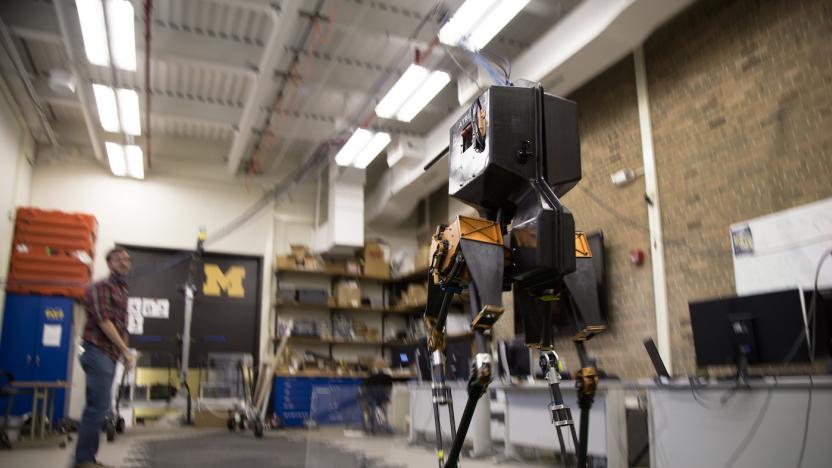algorithm
Latest

System helps spot bias in algorithms
There's no question that algorithms can be biased, producing results that reflect the creator's preconceived opinions. But how do you reliably detect signs of that bias? Carnegie Mellon researchers can help. They've developed a system that tests algorithms to see how much influence a given variable has over the outcome, giving you a sense of where bias exists. It could reveal when a credit score system is giving any weight to racial discrimination, or catch simple mistakes that put too much emphasis on a particular factor.

U of M's Marlo robot uses algorithms to conquer uneven terrain
Robots walking unaided on flat ground is tough enough as it is -- just look at last year's class of DARPA Challenge failures -- so when one can handle uneven terrain in any direction (not just a straight line), we take notice. The latest example is Marlo, a joint project between University of Michigan's Jessy Grizzle and Oregon State University's Jonathan Hurst. The key difference here is how it achieves this feat: a bank of algorithms containing different instructions for different walking styles.

Elon Musk's AI initiative opened an online dojo
I'm going to go out on a limb here and say that the artificial intelligence you coded in your garage probably doesn't have the type of resources behind it that Google used to make DeepMind a fearsome Go competitor. That's what the Elon-Musk-backed OpenAI Gym is for. It's in open beta right now, and available test environments include Go on 9x9 and 19x19 boards, a ton of classic Atari games and robot control simulations, among others, with more to come.

Facebook ranks articles based on how long you read them
The Instant Articles and other content in your Facebook News Feed aren't picked by magic. The company scrutinizes what kind of stories you want to read based on your clicks, shares or comments, then serves up more of the same. The social network already analyzes how long you spend reading stories while you're still in the app. Now, it will also measure how long you spend on an article after you click away from the News Feed, without counting the load times.

There's no perfect equation for getting laid in the Tinder age
Last July, I joined Grindr and things started off strong. I had a few good screws, a handful of hot dates and an intense summer fling. I saw more action in six months than I'd seen in the past three years. I was winning and a computer was helping me do it. Then, after an eight-day trip to Las Vegas this past January, all the action dried up.

Instagram says it's not changing your feed... yet
The internet flung into a panic today as users prepped for Instagram to change how images display in its feed. Earlier this month, the filter-driven photo app announced that it would switch from a chronological order of photos to an algorithm-based approach like Facebook does with the News Feed and Twitter's option for organizing Timelines. The idea is to push things the software thinks you'd like to see more to the top, but, of course, this means you're likely to miss out on some things, too. Based on the high level of panic and the service being inundated with posts begging followers to turn on notifications, Instagram took to Twitter to assure us that nothing is changing yet.

Computers can tell when you've been drunk tweeting
In case the rambling string of misspelled words and incoherent thoughts weren't dead giveaways, scientists have developed a method of machine learning to sniff out drunk tweets. Researchers from the University of Rochester collected 11,000 geotagged tweets over a year from two areas: New York and Monroe County, filtering the 140-character notes containing "drunk," "beer," "party" and other libation-related words. From there the school employed Amazon Mechanical Turks to decide whether the person sending the tweets was simply talking about booze or were actually drinking it while tweeting.

Quantum computer revolves around just 5 atoms
It's no mean feat to find the factors of a very large number -- even a supercomputer can take years to find all the multipliers. However, MIT researchers have found a way to clear this massive hurdle. They've built a quantum computer that discovers number factors using just five atoms. Four of the atoms are turned into logic gates using laser pulses that put them into superpositions (where they maintain two different energy states at once), while the fifth atom stores and delivers answers. The result is a computer that not only calculates solutions much more efficiently than existing quantum systems, but scales relatively easily. Need to get the factors for a larger number? Introduce more atoms.

ICYMI: Rogue wave detection, exo-glove and more
#fivemin-widget-blogsmith-image-127753{display:none;} .cke_show_borders #fivemin-widget-blogsmith-image-127753, #postcontentcontainer #fivemin-widget-blogsmith-image-127753{width:570px;display:block;} try{document.getElementById("fivemin-widget-blogsmith-image-127753").style.display="none";}catch(e){}Today on In Case You Missed It: Researchers at Seoul National University developed the Exo-Glove Poly, which can help wearer's perform difficult tasks like opening doors or grasping delicate objects. MIT built an algorithm to help detect rogue waves and warn sailors about them. And the Leidenfrost effect of a water droplet landing on a hot griddle and hovering above steam had never been captured on video, until now. We also covered a bunch of news in TL;DR but most urge you to dive into the latest on Apple vs. FBI, or for fun, read about what algae injections can do to vision. As always, please share any interesting science or tech videos, anytime! Just tweet us with the #ICYMI hashtag to @mskerryd.

Game algorithm could help win elections
There's a particular strain of game theory, Colonel Blotto, that many believe could predict the outcomes of everything from elections to sports matches. It asks two sides to distribute soldiers over a battlefield, and hands wins to whoever has the most soldiers in a given area. However, it has one glaring problem: there hasn't been a way to get a firm solution. Well, computer scientists have finally found that last piece of the puzzle. They've developed an algorithm that can solve the Colonel Blotto game, making it useful as a strategic tool whenever there's a one-on-one situation.

UCLA open sources image detector that can see what we can't
UCLA has released the source code to powerful image detection software that can see an object's every detail at high speed -- key for applications like fingerprint and iris scanning, or self-driving cars. It starts by identifying an object's edges and then looking for and extracting its other, fainter features. For instance, if there are items with textured surfaces in the image, the algorithm can recognize and enhance them, as you can see in the example below the fold. It can even see through bright lights to detect their sources' structures, such as lamps, LED lights and even the moon.

Twitter should make harassment, not algorithms, a priority
The rumors were true: Twitter confirmed today that it's rolling out -- horrors! -- an algorithmic newsfeed. Essentially a version of its "While You Were Away" feature, the new timeline lets you see the "most important tweets" you've missed. Thankfully, as soon as you refresh the page, the standard chronological list of tweets will return, and if you don't like it, it's pretty easy to deactivate in Settings. Which is a good thing, considering it's not a feature many users have asked for. In fact, many of Twitter's recent endeavors have very little at all to do with what its users want.

Software maps the 'Star Wars' universe
You may have a good feel for the scope of the Star Wars universe, but Swiss researchers just took things to another level. They've created maps of the space fantasy series' expanded universe that visualize the connections between 20,000 characters, spanning a period of 36,000 years. The results are surprisingly pretty (you're only seeing a fraction of it above) and help fill in gaps for characters that aren't fully fleshed out, such as where they sit in the timeline. They also turn up facts that might not be readily apparent, even if you're well-versed on the likes of the Old Republic or Grand Admiral Thrawn. For example, just shy of 80 percent of characters are human -- clearly, writers aren't going out of their way to include more Sullustans and Wookiees in their stories.

Robotic system can lead to faster medicine development
A robotic system developed by a group of Carnegie Mellon scientists could make the drug development process faster, cheaper and more efficient. See, drug discovery, which identifies potential new medicine, entails loads of lab testing to determine the effects of different drugs on their target proteins. So many, in fact, that scientists typically have to choose the experiments to run, else they might never be done.

Twitter says your timeline isn't changing (update: details)
Were you panicking at the thought of Twitter messing with your timeline order? Were you declaring #RIPTwitter and getting ready to move to Peach? Relax. Twitter chief Jack Dorsey has piped up to say that there's no truth to the rumors of a Facebook-like feed arriving next week. It was "never planned," he says. In fact, Dorsey adds that the company hopes to make Twitter "feel more, not less, live" -- he knows full well that you want that steady stream of updates.

Twitter's Facebook-style timeline could arrive next week
Completing the process of Facebook and Twitter doing battle by copying all of each other's features, a report by Buzzfeed says that Twitter could debut its "algorithmic" feed as early as next week. Since it launched, the microblogging service has always displayed tweets in a reverse chronological order. Users have recently spotted tests where tweets were reshuffled out of order, similar to Facebook's method of sorting posts, and executives have hinted at just such a change for years.

Sundance champ 'Birth of a Nation' chose Fox over Netflix
This weekend Nate Parker's film The Birth of a Nation won the Sundance Film Festival Grand Jury and Audience prizes for a drama, just days after signing a record $17.5 million distribution deal with Fox Searchlight. That was in contrast to a number of other flicks that ended up signing with Netflix or Amazon, and there's a reason. While reports from The Wrap and The Hollywood Reporter claim Netflix offered as much as $20 million during an all night bidding war, Parker wanted a large theatrical release for the movie. While Netflix movies are open for theatrical releases, so far they've had extremely limited showings because the company insists on offering them for streaming on the same day -- most theater owners don't want the competition.

Google's latest data-squeezing algorithm is coming to Chrome
Google is no Silicon Valley startup, but it's just as intent on creating compression algorithms as the fictional "Pied Piper." The search giant is about to unleash its latest algorithm, called "Brotli," onto the Chrome browser. The software compression team first revealed the algorithm in September, saying that it was 20 to 26 percent more efficient than Zopfli, an algorithm it launched only three years before. Google says that Brotli is a "whole new data format" that squeezes in more data than other compression formats, while decompressing at comparable speeds.

Watch a smart drone fly through a 'forest' all on its own
Drones can already find their way around obstacles, but they're usually looking for obvious obstacles like walls. What about navigating through tiny spaces where there may be just inches to spare? MIT has the answer. It just demonstrated tiny quadcopter drones using cutting-edge algorithms (the same ones used in the walking Atlas robot) to wend their way through a "forest" of 26 closely-packed obstacles. The trick is to flip the usual pathfinding routine on its head -- rather than plan a course based on the obstacles, the algorithms look for free spaces and string them together to create a safe route. As the video below shows, the result is a drone that zips effortlessly around poles and wires.

Tinder's hidden score rates your 'desirability'
If you've used Tinder often enough, you've probably wondered whether there was a science behind who your matches are. Well, it's now certain that there is -- although whether or not you like it is another matter. Tinder tells Fast Company that it gives everyone a hidden "desirability" score based on an algorithm determined by "a lot of factors." The company isn't clear about what those are (trade secrets!), but the suggestion is that it's partly a reflection of how closely you match traits that convince people to swipe right. If you have a fully fleshed-out profile with interesting photos, for example, you may be more alluring than someone who posted the bare minimum and a humdrum profile shot.








